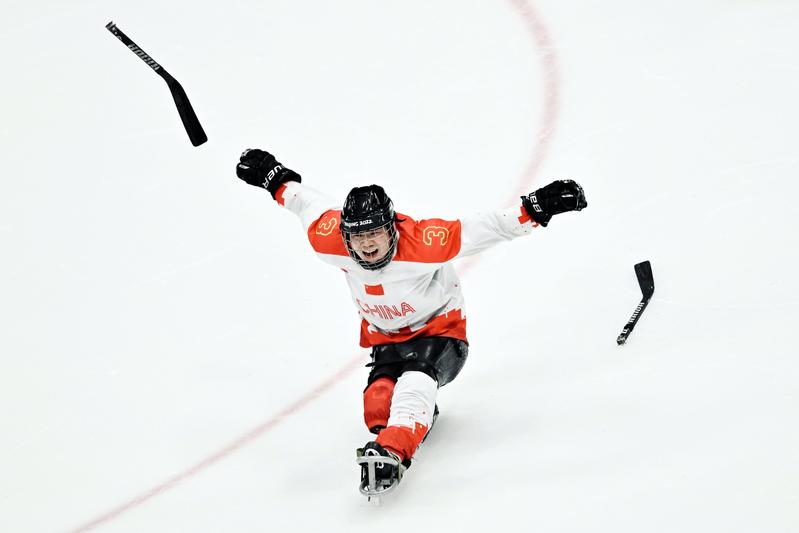Beijing Winter Paralympics now the benchmark that future hosts will aspire to
 China's Lyu Zhi celebrates his team's victory over the Republic of Korea in the para ice hockey bronze-medal match on Saturday. (WEI XIAOHAO / CHINA DAILY)
China's Lyu Zhi celebrates his team's victory over the Republic of Korea in the para ice hockey bronze-medal match on Saturday. (WEI XIAOHAO / CHINA DAILY)
Thrilling competitions, smooth organization and superb services all combined to make Beijing 2022 the new benchmark for staging Winter Paralympic Games.
As a bonus for the host, Team China finished top of the Winter Paralympics medal table for the first time, with 18 gold, 20 silver and 23 bronze.
The feat was especially remarkable considering China only won its first Winter Paralympic gold medal-in wheelchair curling-at the 2018 Pyeongchang Games.
China's steady stream of champions made national headlines and became trending news on social media. Among those to enjoy the limelight was Liu Zixu, who won the host's first gold of the Beijing Winter Paralympics, in para biathlon men's sprint sitting on March 5.
The 24-year-old, who also won bronze in the men's individual sitting, was proud to see his hard work finally pay off.
"I just wanted to show my potential, and focus on the competitions-I didn't think too much. I fell down on the snow countless times, but always returned to training right away. I remember I could barely feel my hands, and my sweat turned to ice on my face in the freezing conditions, but I was determined not to stop," said Liu, who lost a leg in a car accident when he was a teenager.
"Only through hard work and pushing my limits could I reach the top of the podium. I'm satisfied with my performances here, but my career has been bumpy enough. I think it's the setbacks and difficulties that have shaped me the most. In future, I will keep pushing myself."
While Team China retained its wheelchair curling title in Beijing, the host nation made numerous breakthroughs in other sports, most notably in para Alpine skiing.
One of the brightest stars at the National Alpine Skiing Center in Yanqing was Zhang Mengqiu, who won China's first gold medal in the sport with victory in the women's super-G standing on March 6.
"I realized my dreams here, and the moment I heard the national anthem on the podium, I was so excited," said the 20-year-old Zhang, who also won gold in the women's giant slalom standing on Friday.
"Winning the first gold medal is the most memorable moment of my Alpine skiing career to date. I will remember it forever. It was really hard when I first started my training, I did not even know how to stop on the snow at the beginning.
"But para Alpine skiing has made me more confident, and also improved my physical condition. This sport has helped me to overcome all difficulties."
Beijing 2022 Organizing Committee (BOCOG) vice-president Yang Shu'an said the rapid improvements made by Team China's para athletes were primarily due to increased participation levels.
"At past Winter Paralympic Games, China participated in very few events, but this year Chinese athletes entered all disciplines," said Yang on Tuesday.
"The biggest reason behind this is the continuous efforts of athletes with disabilities and their strong desire to fully participate in society. At the same time, the Chinese government has always supported the inclusion of people with disabilities in society. Programs for persons with disabilities have benefited from comprehensive development, including para sports.
"With China's economic and social development, there has been increasing care and support for para sports. People with disabilities have always been striving to improve themselves, so it's a combination of factors."
Superb services
All para athletes were given an ideal environment to chase their dreams at the Games, thanks to the top-quality venues, barrier-free facilities, and volunteer services at the three Paralympic villages-in downtown Beijing, the capital's northwest Yanqing district and co-host Zhangjiakou, Hebei province.
The National Indoor Stadium, which hosted para ice hockey, was a shining example of the meticulous planning, organization and execution that made Games venues so special.
The transition work began immediately after the Winter Olympics ice hockey final late last month. To accommodate the para athletes' equipment, the ice was thickened, and the plexiglass barriers which separated the media and players were lowered to make interviews more convenient.
The Paralympic villages offered wide-ranging, 24-hour medical services, wheelchair-friendly canteens with menus in Braille for visually impaired athletes, gyms and recreational areas.
The 2,000-square-meter fitness center at the Paralympic Village in downtown Beijing featured many bespoke facilities for athletes with disabilities.
Over 9,000 volunteers served at the Beijing Winter Paralympics, playing a vital role in ensuring all aspects of life for the athletes went smoothly.
All volunteers underwent specialized training in serving and communicating with people with disabilities, while 12 of the volunteers themselves had disabilities.
"The youngest of the 12 is just 19 years old, while the oldest is 63.They hail from various walks of life, including university students, retired para athletes, medical workers, teachers, and community workers," said Liu Lili, deputy director of the communication and training division of the Paralympic Games integration department.
"They have different skillsets, and some have experience of serving at sports events in the past, such as the Beijing Marathon. Their participation at the Paralympics is testament to their dedication and professionalism. They personify the ideal of contributing to society and show how much people with disabilities can contribute themselves."
In addition, the comprehensive barrier-free environment that was installed at all Paralympic sites and transportation services made athletes' day-to-day experience extra smooth.


